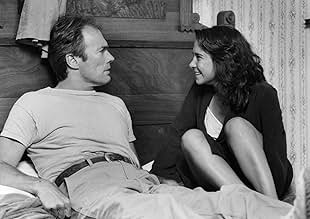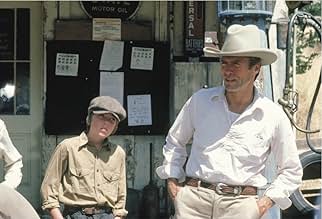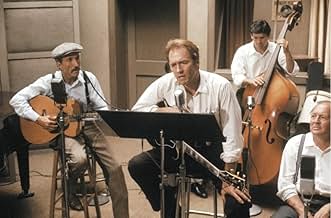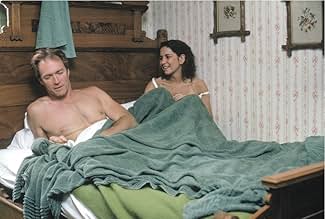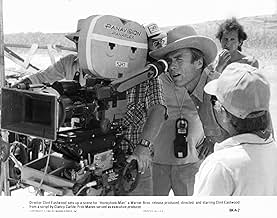A boy with a music talent goes on a journey with his uncle for a stage concert.A boy with a music talent goes on a journey with his uncle for a stage concert.A boy with a music talent goes on a journey with his uncle for a stage concert.
- Awards
- 1 nomination total
- Director
- Writer
- All cast & crew
- Production, box office & more at IMDbPro
6.610K
1
2
3
4
5
6
7
8
9
10
Featured reviews
Ironic that one of Eastwood's least known films might be one of his most personal...
A little farm somewhere in Oklahoma that can be mistaken for a Western homestead. But then a red convertible comes toward as uninvited a guest as the dust storm. Then from the worn-out overalls and the whole sandy texture, we can tell this is the Great Depression. So just before the story starts, a series of vignettes popped in my mind: families, nostalgia, America, country music, blues, road movies...I knew what to expect.
The car stops before it hurts someone (except for the driver and an ill-placed windmill), the driver isn't dead but "dead drunk", it's the family's uncle from Mama's side. He doesn't know it yet but the life of fourteen-year old Whit (Kyle Eastwood) is taking a new turn very soon. That boy spent his life staring at the emptiness of the Oklahoman plains while sitting on the house steps, so he welcomes the visitor as good news and what is hidden in the car's trunk is more than promising: it's a guitar, smooth and shiny.
As Red Stovall, Clint Eastwood makes an interesting variation on the 'cool uncle' figure, the one who travels a lot, tells interesting stories and always bring items that cut through the daily banality. Eastwood doesn't even make him unlikable, just a bit gruff, but this is a man who likes music and can only appreciate that a kid likes it. Whit's father (Matt Clark) is a frustrated farmer with the look of someone who kept eating the sour grapes of wrath, Red can see that this is no inspiring figure for a kid at the verge of adulthood while Whit admires his detachment and his badass stetson. The bond is tacit but immediate, Whit cleans his uncle's car so good one could see his face there, he makes it ready for a new start as if he felt he would be part of it.
Road movies and Great Depressions form an inevitable narrative pairing, that was the time of John Steinbeck and famers emigrating, the time Bonnie and Clyde filled the headlines while emptying small town banks, the time artists translated their ordeals into songs that built up to country music, and that's Red's dream: a stage concert in the Grand Ole Opry in Nashville. The mother (Verma Bloom) is worried about her brother's suspect coughs and accepts to have his son following him. The third passenger is Grandpa (John McIntre) who wants to go back to Tennessee, being the one instance of a man moving toward a brighter death.
As usual, Eastwood plays a man with a secret past, once we suspect triggered his alcoholism and choice for celibacy, a broken romance, a bad choice, a fear of success, who knows? There's obviously something buried in that soul that the gentle poetry of country music can dig out one shovelful at once. Like I said in many reviews, country music is all about telling stories. The film's gone for one hour when Red unveils his secrets and once they come, we're not even surprised for they were already hinted in the songs he played in shabby motels, musical clubs and honkytonks. The songs told his story allowing the rest to be totally devoted to a tender picturesque uncle-and-nephew journey.
And so we see them traveling, making halts in colorful little towns, fixing their cars and visiting whorehouses to pursue the initiation of little Whit, he breaks a promise by drinking some bootleg whisky, he has his first dizzying inhalations but nevertheless remains a good kid, being as essential a driver and assistant to Red as Red is a mentor. What they have in common than is that they're aware of their limitations but are willing to take chances, still better than working in a plantation. They're right on the long term because country music doesn't nourish people as folks do but we do remember folks through country music. The audition is Red's ticket for immortality.
Now, "The Honkytonk Man" is one of these low-key Eastwood movies that only invite you to take each moment as it comes and see where it's leading up to. You have a few chuckles when they steal hens and get arrested, you're in awe of the grandpa recalling his memories of the Oklahoma rush, September 16 1893 I remember it, and you just enjoy the music. And what do you know, at the end you realize that you've enjoyed a little gem, it had a story, it had character development and once again with Clint Eastwood, even the 'minor' offerings have major things to say. This time, it's about the roots of America, the art form it originated without any European inspiration, the best that could come from the most difficult times.
The atmosphere of the era is well-restored, there are some cameos from real artists and overall, the material adapted from Clancy Carlile's novel doesn't go for the big dramatic twist. Just when you expect a deadly confrontation with a shady debtor might end bad, it's played for laughs and introduces a plucky wannabe musician named Marlene (Alexa Kenin) who also wants to make it big in Nashville, she's not a love interest, not a sidekick, but just a girl eager to get one chance to change her life, she's as willing as the others. I was really impressed by her comedic potential, making Kyle Eastwood a little bland in comparison. It's quite sad the actress passed away shortly after the film.
I don't use "low-key" as a synonym of "unpretentious", Clint Eastwood is a child of the Great Depression, if he wasn't exactly from a poverty-stricken family, he grew up with the spectacle of Okies coming to pick oranges or cotton in California and listening to radio and country music. I'm no musical expert but I could feel the passion in his songs, and from the simple but poignant way he tells his story, you can tell Eastwood had it in him. How ironic that one of his lesser known film might be his most personal.
The car stops before it hurts someone (except for the driver and an ill-placed windmill), the driver isn't dead but "dead drunk", it's the family's uncle from Mama's side. He doesn't know it yet but the life of fourteen-year old Whit (Kyle Eastwood) is taking a new turn very soon. That boy spent his life staring at the emptiness of the Oklahoman plains while sitting on the house steps, so he welcomes the visitor as good news and what is hidden in the car's trunk is more than promising: it's a guitar, smooth and shiny.
As Red Stovall, Clint Eastwood makes an interesting variation on the 'cool uncle' figure, the one who travels a lot, tells interesting stories and always bring items that cut through the daily banality. Eastwood doesn't even make him unlikable, just a bit gruff, but this is a man who likes music and can only appreciate that a kid likes it. Whit's father (Matt Clark) is a frustrated farmer with the look of someone who kept eating the sour grapes of wrath, Red can see that this is no inspiring figure for a kid at the verge of adulthood while Whit admires his detachment and his badass stetson. The bond is tacit but immediate, Whit cleans his uncle's car so good one could see his face there, he makes it ready for a new start as if he felt he would be part of it.
Road movies and Great Depressions form an inevitable narrative pairing, that was the time of John Steinbeck and famers emigrating, the time Bonnie and Clyde filled the headlines while emptying small town banks, the time artists translated their ordeals into songs that built up to country music, and that's Red's dream: a stage concert in the Grand Ole Opry in Nashville. The mother (Verma Bloom) is worried about her brother's suspect coughs and accepts to have his son following him. The third passenger is Grandpa (John McIntre) who wants to go back to Tennessee, being the one instance of a man moving toward a brighter death.
As usual, Eastwood plays a man with a secret past, once we suspect triggered his alcoholism and choice for celibacy, a broken romance, a bad choice, a fear of success, who knows? There's obviously something buried in that soul that the gentle poetry of country music can dig out one shovelful at once. Like I said in many reviews, country music is all about telling stories. The film's gone for one hour when Red unveils his secrets and once they come, we're not even surprised for they were already hinted in the songs he played in shabby motels, musical clubs and honkytonks. The songs told his story allowing the rest to be totally devoted to a tender picturesque uncle-and-nephew journey.
And so we see them traveling, making halts in colorful little towns, fixing their cars and visiting whorehouses to pursue the initiation of little Whit, he breaks a promise by drinking some bootleg whisky, he has his first dizzying inhalations but nevertheless remains a good kid, being as essential a driver and assistant to Red as Red is a mentor. What they have in common than is that they're aware of their limitations but are willing to take chances, still better than working in a plantation. They're right on the long term because country music doesn't nourish people as folks do but we do remember folks through country music. The audition is Red's ticket for immortality.
Now, "The Honkytonk Man" is one of these low-key Eastwood movies that only invite you to take each moment as it comes and see where it's leading up to. You have a few chuckles when they steal hens and get arrested, you're in awe of the grandpa recalling his memories of the Oklahoma rush, September 16 1893 I remember it, and you just enjoy the music. And what do you know, at the end you realize that you've enjoyed a little gem, it had a story, it had character development and once again with Clint Eastwood, even the 'minor' offerings have major things to say. This time, it's about the roots of America, the art form it originated without any European inspiration, the best that could come from the most difficult times.
The atmosphere of the era is well-restored, there are some cameos from real artists and overall, the material adapted from Clancy Carlile's novel doesn't go for the big dramatic twist. Just when you expect a deadly confrontation with a shady debtor might end bad, it's played for laughs and introduces a plucky wannabe musician named Marlene (Alexa Kenin) who also wants to make it big in Nashville, she's not a love interest, not a sidekick, but just a girl eager to get one chance to change her life, she's as willing as the others. I was really impressed by her comedic potential, making Kyle Eastwood a little bland in comparison. It's quite sad the actress passed away shortly after the film.
I don't use "low-key" as a synonym of "unpretentious", Clint Eastwood is a child of the Great Depression, if he wasn't exactly from a poverty-stricken family, he grew up with the spectacle of Okies coming to pick oranges or cotton in California and listening to radio and country music. I'm no musical expert but I could feel the passion in his songs, and from the simple but poignant way he tells his story, you can tell Eastwood had it in him. How ironic that one of his lesser known film might be his most personal.
the story of many a musician
...and for that matter any human being.
Clint Eastwood's little masterpiece is filled with insights of human
nature and our dreams and how futile but nonetheless honorable
they are in most cases.
Watch out for many keys to understand low(er) class white Americans
and how music is one of the very best ways to bring them together
with, or at least closer to, African Americans. Without gospel, blues
and jazz - three styles developed by black people in the US during
the early 20th century - there would (arguably) be no country music and of
course no pop music (as it is today).
I am a musician and this little masterpiece certainly means a lot to
me and my colleagues all over the world.
This movie definitely is a metaphor of life and Clint Eastwood uses his second passion after cinema, music, as the
base but it contains so much more deep philosophy and homage
that I do not hesitate calling it a small masterpiece.
IMHO Honkytonk Man is for Clint Eastwood what Little Man Tate
(1991) is for Jodie Foster - only better, much better. Just think
about the fact that Clint went back (explained in a monologue) for
his skinny girl. After all he did love her.
It takes cojones to make a movie like that. Great work Mr.
Eastwood.
Clint Eastwood's little masterpiece is filled with insights of human
nature and our dreams and how futile but nonetheless honorable
they are in most cases.
Watch out for many keys to understand low(er) class white Americans
and how music is one of the very best ways to bring them together
with, or at least closer to, African Americans. Without gospel, blues
and jazz - three styles developed by black people in the US during
the early 20th century - there would (arguably) be no country music and of
course no pop music (as it is today).
I am a musician and this little masterpiece certainly means a lot to
me and my colleagues all over the world.
This movie definitely is a metaphor of life and Clint Eastwood uses his second passion after cinema, music, as the
base but it contains so much more deep philosophy and homage
that I do not hesitate calling it a small masterpiece.
IMHO Honkytonk Man is for Clint Eastwood what Little Man Tate
(1991) is for Jodie Foster - only better, much better. Just think
about the fact that Clint went back (explained in a monologue) for
his skinny girl. After all he did love her.
It takes cojones to make a movie like that. Great work Mr.
Eastwood.
Don't get too cozy.
An under appreciated 80s effort (being Eastwood's ninth stint directing a major feature), which rarely gets a mention and if so it mainly gets a "meh". This Clint Eastwood directed/performed feature 'Honkytonk Man' shows much more a vulnerable Eastwood in a very dramatic role (of an aging, alcoholic drifting country singer) that asked a lot from him. Set during the period of the great depression that ravaged the 1930s, Eastwood manages to capture the authentic atmosphere and dusty locations of the times with Bruce Surtees's earthy photography and his very-grounded direction, but also letting the harshness move over for some very sentimental openings that never manipulate the situations. There's a real homegrown feel, mixing elements of a coming of age story to someone longing to be somebody and this is all coming together to learn not to take everything on face-value. We watch two people, fulfilling a dream as it ignites the passion leaving to a series of adventures and an insightful script exploring the interactions.
It's an inspired turn by Eastwood, but his son Kyle Eastwood is just as impressive in a sincerely down-to-earth performance as the young lad Whit, the 14 year old nephew that makes sure that he gets his uncle to the Gran Ole Opry stage to do his thing albeit trying to keep him sober to perform. Along for the journey you'll find the likes of John McIntire, Alexa Kenin, Tim Thomerson, Barry Corbin, Macon McCalman, Joe Regalbuto and Charles Cyphers making up a splendidly admirable cast. A very heart-warming Verna Bloom and sturdy Matt Clark do leave their marks as Whit's worrying parents. While rather long, the chemistry makes sure the story marvelously flows and the relax temperament lets the emotional factor seep in. I don't know, but I found it hard not to like. The score is a perfectly delightful country twang featuring numerous names in Marty Robbins, Frizzel and West, Ray Price, Linda Hopkins and supervised by Snuff Garrett. Let's not forget Eastwood himself adding to the arrangement.
A wonderfully brassy and enterprising Eastwood fable.
It's an inspired turn by Eastwood, but his son Kyle Eastwood is just as impressive in a sincerely down-to-earth performance as the young lad Whit, the 14 year old nephew that makes sure that he gets his uncle to the Gran Ole Opry stage to do his thing albeit trying to keep him sober to perform. Along for the journey you'll find the likes of John McIntire, Alexa Kenin, Tim Thomerson, Barry Corbin, Macon McCalman, Joe Regalbuto and Charles Cyphers making up a splendidly admirable cast. A very heart-warming Verna Bloom and sturdy Matt Clark do leave their marks as Whit's worrying parents. While rather long, the chemistry makes sure the story marvelously flows and the relax temperament lets the emotional factor seep in. I don't know, but I found it hard not to like. The score is a perfectly delightful country twang featuring numerous names in Marty Robbins, Frizzel and West, Ray Price, Linda Hopkins and supervised by Snuff Garrett. Let's not forget Eastwood himself adding to the arrangement.
A wonderfully brassy and enterprising Eastwood fable.
Heading For The Promise Land
Set in Depression era Oklahoma, this film tells the story of a dirt poor, alcoholic singer named Red Stovall (Clint Eastwood), who heads out for Nashville, in hopes of making it big as a country singer. The story begins on a dilapidated farm composed mostly of dust, where Red's sister hesitatingly allows her son Whit (Kyle Eastwood) to go with Red to Nashville. The kid's Grandpa (John McIntire) also wants to go, to return to his native Tennessee. The film's beginning is dreary and depressing, but wonderfully realistic of the dust bowl days of the 1930s.
Much of the plot takes place on the road, as the three travelers encounter an assortment of characters and problems along the way. The most important character they meet is a young girl named Marlene (the late Alexa Kenin), who yearns to be a country singer. It's one of many plot contrivances, but at least this contrivance offers some humor, especially when Marlene ... "sings". Other plot contrivances include a jailbreak, an angry bull, an aborted robbery, and an incident involving a chicken coop.
If the film's weakness is excess contrivances, the film's strength is the portrayal of Red as an interestingly complex character. He coughs a lot, a symptom of tuberculosis. And the TB is getting worse. The question is ... will Red be able to reach the promise land before the disease affects his ability to sing? And, in a long monologue aimed at Whit, Red talks about his long-ago love affair with Mary Sims.
The film's acting is credible, if not outstanding. Kyle Eastwood does a nice job as Whit. The film also features cameos by several then-current country singers. At the end, there's some sad real-life irony as Marty Robbins helps Red.
"Honkytonk Man" has some good atmosphere. Arguably, the best segment is at the Top Hat Club on Beale Street in Memphis, where the great Linda Hopkins belts out a blues number. If the film's writer had ditched some of those hokey "on the road" contrivances, and focused the plot more in smoky old bar rooms with low light levels and mournful music, the film would have been a lot better. As is, "Honkytonk Man" is still worth a look, if for no other reason than to see a low-key character study, in contrast to the brash and gaudy big ticket films of that cinematic era, like "Raiders Of The Lost Ark" and "Star Wars".
Much of the plot takes place on the road, as the three travelers encounter an assortment of characters and problems along the way. The most important character they meet is a young girl named Marlene (the late Alexa Kenin), who yearns to be a country singer. It's one of many plot contrivances, but at least this contrivance offers some humor, especially when Marlene ... "sings". Other plot contrivances include a jailbreak, an angry bull, an aborted robbery, and an incident involving a chicken coop.
If the film's weakness is excess contrivances, the film's strength is the portrayal of Red as an interestingly complex character. He coughs a lot, a symptom of tuberculosis. And the TB is getting worse. The question is ... will Red be able to reach the promise land before the disease affects his ability to sing? And, in a long monologue aimed at Whit, Red talks about his long-ago love affair with Mary Sims.
The film's acting is credible, if not outstanding. Kyle Eastwood does a nice job as Whit. The film also features cameos by several then-current country singers. At the end, there's some sad real-life irony as Marty Robbins helps Red.
"Honkytonk Man" has some good atmosphere. Arguably, the best segment is at the Top Hat Club on Beale Street in Memphis, where the great Linda Hopkins belts out a blues number. If the film's writer had ditched some of those hokey "on the road" contrivances, and focused the plot more in smoky old bar rooms with low light levels and mournful music, the film would have been a lot better. As is, "Honkytonk Man" is still worth a look, if for no other reason than to see a low-key character study, in contrast to the brash and gaudy big ticket films of that cinematic era, like "Raiders Of The Lost Ark" and "Star Wars".
minor classic
Despite almost every critic I've read, I think this is a real gem by Clint Eastwood. A honest, sensitive effort in the road movie tradition. The minor tone, the naive sequences soothe Red Stovall's journey to his fate. The movie also displays a touching view of the depression era in USA. Like animated Roy Emerson Stryker's pictures the photography is remarkable as well as the sound track. I've learned about lots of singers and musicians that recorded only to give a final testimony of their art. I guess stories like these deserved a movie like Honkytonk Man. Long life to Clint, one of the most underrated talents not only in Hollywood but in the rest of the world.
Did you know
- TriviaThe script originally called for Whit (Kyle Eastwood) to get high from smoking marijuana, but Clint Eastwood, who is very anti-drug, refused, even with Kyle using a prop cigarette. Eastwood finally relented to his son's character getting high from a contact buzz.
- GoofsRyman Auditorium is used as the setting for the Opry. This venue was not used until the 1940s, and the movie takes place in the 1930s.
- Alternate versionsABC edited 7 minutes from this film for its 1986 network television premiere.
- ConnectionsFeatured in At the Movies: Dueling Critics (1983)
- SoundtracksHonkytonk Man
Sung by Marty Robbins and Clint Eastwood
- How long is Honkytonk Man?Powered by Alexa
Details
- Release date
- Country of origin
- Language
- Also known as
- El aventurero de medianoche
- Filming locations
- Fallon, Nevada, USA(scene with bull)
- Production company
- See more company credits at IMDbPro
Box office
- Budget
- $2,000,000 (estimated)
- Gross US & Canada
- $4,484,991
- Opening weekend US & Canada
- $667,727
- Dec 19, 1982
- Gross worldwide
- $4,484,991
- Runtime
- 2h 2m(122 min)
- Sound mix
- Aspect ratio
- 1.85 : 1
Contribute to this page
Suggest an edit or add missing content


